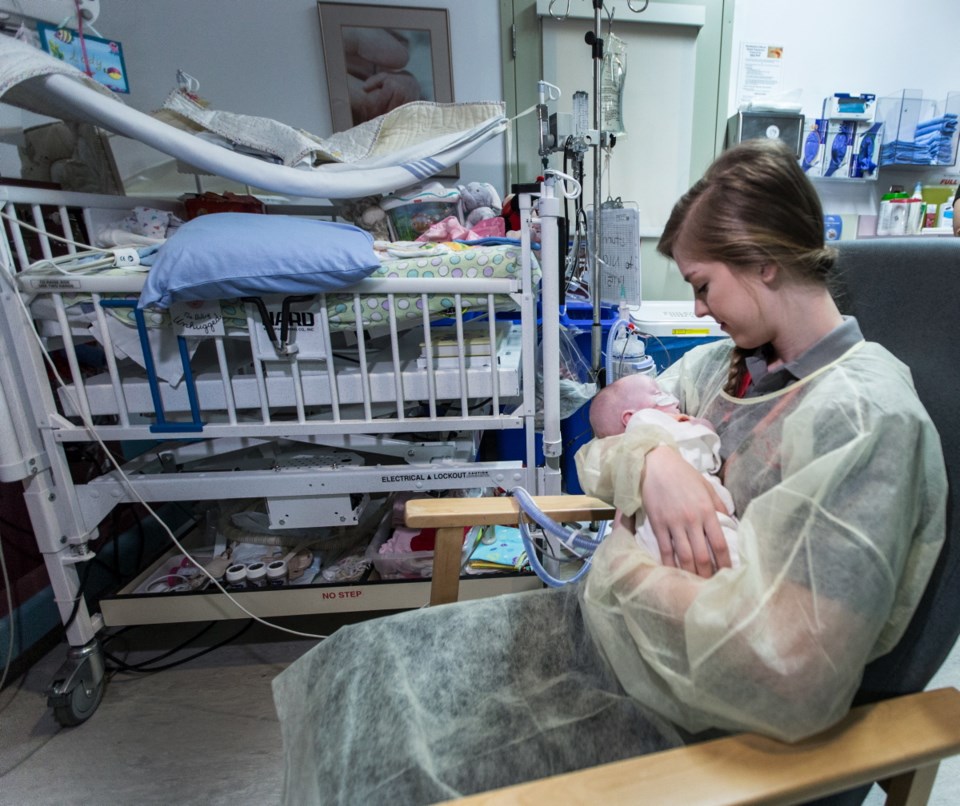In a nursery in the neonatal intensive care unit at Victoria General Hospital, a tiny baby squirms and gives a smile to the woman rocking her.
Sarah Byam isn’t a doctor or a nurse or even young Lady’s mother — she’s one of the hospital’s first volunteer “huggers.”
“You feel very special, you feel very lucky,” Byam said.
Victoria General Hospital is the first on the West Coast to host the Huggies No Baby Unhugged program, which puts babies from the neonatal and pediatric intensive care units into volunteers’ arms for up to hours at a time.
While hugging vulnerable newborns was once discouraged, Dr. Jeff Bishop said research has shown human touch is vital to an infant’s development.
The discovery is changing the way care is delivered to babies in intensive care in a variety of ways.
“We know with [premature babies] that skin-to-skin contact is so important, to the extent that we’re actually changing the way we do neonatal resuscitation,” said Bishop, a physician in the pediatric intensive care unit.
“Whereas previously, babies were immediately whisked away from their moms and resuscitated, now, most of that resuscitation is taking place in bed with mom.”
Physical touch can help premature babies gain weight faster, stay warmer, stave off infections and regulate their heart rates, he said.
For toddlers in the pediatric intensive care unit, cuddling has also helped reduce chemical interventions, he said.
“Our model for years was very much to admit the kids, sedate them heavily and allow their bodies to recover,” Bishop said. “We found that doesn’t work well.
“We’re now aiming for the minimum level of sedation, the minimum level of medication and drugs that we need to use, to keep the kids safe. And often parents or personal interaction plays a huge role in that.”
Volunteer huggers can help give parents a much needed break during a high-stress time. Families travel to Victoria General Hospital from across Vancouver Island for specialized care.
“They’re often exhausted, they’ve been up with their critically ill kids for sometimes days. They’ve arrived in a brand new environment and they need a rest,” Bishop said.
“If [the parents] don’t know that their kids are loved and receiving the contact they need, they can’t leave and often don’t feel comfortable taking care of themselves.”
Cindy Dent, whose 11-month-old son Gabriel has been at Victoria General Hospital since birth because of a rare neuromuscular disorder, said volunteer huggers give her peace of mind to take much-needed breaks.
“I can’t be here 24-7,” Dent said. “So having volunteers come in and play with Gabe and give him attention and love and everything he needs means a lot and makes me feel more comfortable about leaving.”
Volunteer Kathy Vandermeulen said her own two babies had a very different experience with neonatal care.
Twenty-six years ago, Vandermeulen had her first premature baby. Eight months later, she had a second. They both weighed under two pounds.
“Back in the day, when my kids were born, they didn’t encourage you to have the touch and the hug. At that time, they felt it was doing more harm than good,” she said.
“Now they realize it’s so important for their well-being, their mental health, their physical health, to have that touch. So it’s almost therapeutic for me, as well.”
Vandermeulen said such a program would have benefited her as a parent.
“This program would have been so handy, because I had an eight-month-old at home and I was trying to get to the hospital every day, while my husband was in the military and away.”
Charmaine Niebergall, manager of volunteer resources, said volunteers are interviewed and vetted with criminal record checks and references.
Niebergall said Island Health does not currently need more volunteer baby-huggers, but is always interested in recruiting more people to join its legion of 7,000 volunteers across the Island.



